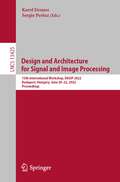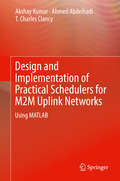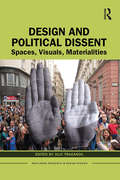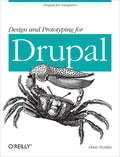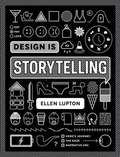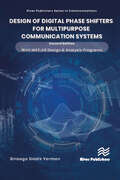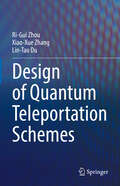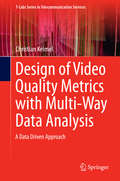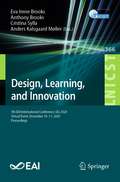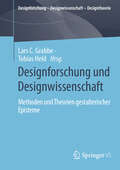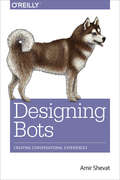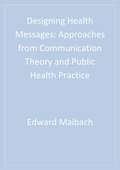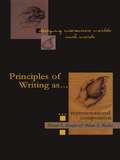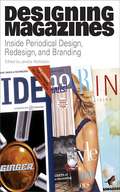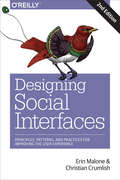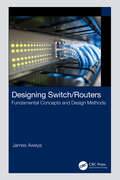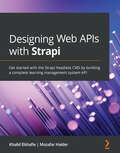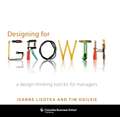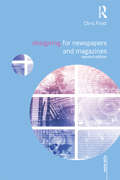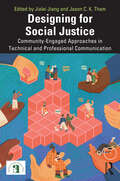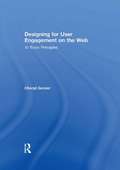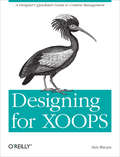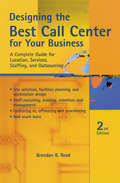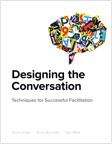- Table View
- List View
Design and Architecture for Signal and Image Processing: 15th International Workshop, DASIP 2022, Budapest, Hungary, June 20–22, 2022, Proceedings (Lecture Notes in Computer Science #13425)
by Karol Desnos Sergio PertuzThis book constitutes the thoroughly refereed conference proceedings of the First International Workshop on Design and Architecture for Signal and Image Processing, DASIP 2022, held in Budaypest, Hungary in June 2022. The 13 full included in the volume were carefully reviewed and selected from 32 submissions. They are organized in the following topical sections: leading signal, image and video processing and machine learning in custom embedded, edge and cloud computing architectures and systems.
Design and Implementation of Practical Schedulers for M2M Uplink Networks
by Ahmed Abdelhadi T. Charles Clancy Akshay KumarThis book presents the design of delay-efficient packet schedulers for heterogeneous M2M uplink traffic classified into several classes, based on packet delay requirements, payload size, arrival process, etc. Specifically, the authors use tools from queuing theory to determine the delay-optimal scheduling policy. The proposed packet schedulers are designed for a generic M2M architecture and thus equally applicable to any M2M application. Additionally, due to their low implementation complexity and excellent delay-performance, they authors show how they are also well-suited for practical M2M systems. The book pertains primarily to real-time process scheduler experts in industry/academia and graduate students whose research deals with designing Quality-of-Service-aware packet schedulers for M2M packet schedulers over existing and future cellular infrastructure. Presents queuing theoretic analysis and optimization techniques used to design proposed packet scheduling strategies;Provides utility functions to precisely model diverse delay requirements, which lends itself to formulation of utility-maximization problems for determining the delay- or utility-optimal packet scheduler;Includes detail on low implementation complexity of the proposed scheduler by using iterative and distributed optimization techniques.
Design and Implementation of Sensory Solutions for Industrial Environment: Utilizing 1-wire® Technology in Industrial Solutions (Signals and Communication Technology)
by Juraj Ďuďák Gabriel GašparThis book presents applicable guidance into sensor system hardware and software design, extensions, and integration aimed at utilization of 1-wire networks. The content is structured from the design of the sensor system architecture—hardware and software—through the implementation and optimization of the solution to the practical verification. The hardware part consists of the design of specific solutions for sensor data collection and the design and integration of standard and special sensors into these solutions. The development of the hardware solutions is focused on integration with 32-bit microcontrollers with ARM Cortex M0 to Cortex M4 cores. For the sensor solutions, the focus is on design versatility and miniaturization of dimensions with respect to the availability of the technology in the physical design. The focus is on minimizing power consumption to the design of power independent modules. The presented solution includes the design and implementation of the software layer, which includes control software for direct communication with the sensor modules as well as an information system for continuous data storage and remote access. The book presents an extensive case study that describes the design and development of a 1-wire bus controller hardware module solution with proprietary modifications that achieve improvements to the maximum 1-wire bus length. The study also includes the design and implementation of a universal and power independent 1-wire bus device. Using this module, almost any sensor can be connected to the 1-wire bus.
Design and Political Dissent: Spaces, Visuals, Materialities (Routledge Research in Design Studies)
by Jilly TraganouThis book examines, through an interdisciplinary lens, the relationship between political dissent and processes of designing. In the past twenty years, theorists of social movements have noted a diversity of visual and performative manifestations taking place in protest, while the fields of design, broadly defined, have been characterized by a growing interest in activism. The book’s premise stems from the recognition that material engagement and artifacts have the capacity to articulate political arguments or establish positions of disagreement. Its contributors look at a wide array of material practices generated by both professional and nonprofessional design actors around the globe, exploring case studies that vary from street protests and encampments to design pedagogy and community-empowerment projects. For students and scholars of design studies, urbanism, visual culture, politics, and social movements, this book opens up new perspectives on design and its place in contemporary politics.
Design and Prototyping for Drupal: Drupal for Designers
by Dani NordinItching to build interesting projects with Drupal, but confused by the way it handles design challenges? This concise guide helps small teams and solo website designers understand how Drupal works by demonstrating the ways it outputs content. You’ll learn how to manage Drupal’s output, design around it, and then turn your design into a theme.In the second of three volumes on Drupal design, award-winning designer Dani Nordin takes you beyond basic site planning and teaches you key strategies for working with themes, layouts, and wireframes. Discover how to use Drupal to make your vision a reality, instead of getting distracted by the system’s project and code management details.Learn strategies for sketching, wireframing, and designing effective layoutsBreak down a Drupal layout to understand its basic componentsUnderstand Drupal’s theme layer, and what to look for in a base themeWork with the 960 grid system to facilitate efficient wireframing and themingManage Drupal markup, including the code generated by the powerful Views moduleUse LessCSS to organize CSS and help you theme your site more efficiently
Design is Storytelling
by Ellen LuptonA playbook for creative thinking, created for contemporary students and practitioners working across the fields of graphic design, product design, service design and user experience. Design Is Storytelling explores the psychology of visual perception from a narrative point of view. Presenting dozens of tools and concepts in a lively, visual manner, this book will help any designer amplify the narrative power of their work. Use this book to stir emotions, build empathy, articulate values and convey action; to construct narrative arcs and create paths through space; integrate form and language; evaluate a project’s storytelling power; and to write and deliver strong narratives.
Design of Digital Phase Shifters for Multipurpose Communication Systems
by Binboga Siddik YarmanThis book aims to cover a new emerging need in designing digital phase shifter for modern communication systems. With the advancement of new generation mobile communication systems, directed beams of antenna arrays save a substantial amount of power as well as improve the communication quality. In this regard, beam-forming circuits, such as digital phase shifters (DPS) constitute essential parts of the antenna array systems. Therefore, this book is devoted to the design of digital phase shifters for various communications systems. Nowadays, phase array systems demand compact phase shifters suitable for chip implementation with wide phase-range and broad frequency band. Each chapter of this book is organized as stand-alone in such a way that the reader requires no specific background acquired from the other chapters. For each phase shifter topology introduced in this book, the reader is furnished with explicit design equations to construct the circuit under consideration. Furthermore, design equations are programmed using MATLAB to assess the electrical performance of the phase shifters with ideal and lossy components. MATLAB design programs are given at the and of each chapter as appendices and provided as soft copy on the web page of the book. In chapters 12 and 14, MMIC layouts for the lattice and T-section based DPS are provided for the readers. It is hoped that an interested reader can immediately identifies the “optimum phase shifter topology” for the need under consideration with its estimated electric performance.
Design of Quantum Teleportation Schemes
by Ri-Gui Zhou Xiao-Xue Zhang Lin-Tao DuThis book offers a design-centered approach to quantum teleportation as well as in-depth analysis of various quantum teleportation schemes. Quantum teleportation, a vital component of practical quantum communication technologies, serves as a secure and reliable way to transmit confidential information. Quantum teleportation relies on the unique physical property of quantum superposition, accomplishing the remote transmission of information through unitary transformations and measurements on entangled states, combined with classical communication. Therefore, as one of the safe and reliable means of quantum state transmission between communicating parties, quantum teleportation is bound to play a vital role in future quantum communication. This book begins with the basics of quantum teleportation before going on to consider various refinements such as controlled, bidirectional, cyclic, symmetric, and asymmetric scenarios. It goes further, investigating a multitude of quantum teleportation schemes in bidirectional, controlled bidirectional, cyclic bidirectional, asymmetric cyclic controlled, and noisy environments, and conducts detailed performance analyses of these schemes. This book is an essential resource for students, researchers, and professionals in the field of quantum communications.
Design of Video Quality Metrics with Multi-Way Data Analysis
by Christian KeimelThis book proposes a data-driven methodology using multi-way data analysis for the design of video-quality metrics. It also enables video- quality metrics to be created using arbitrary features. This data- driven design approach not only requires no detailed knowledge of the human visual system, but also allows a proper consideration of the temporal nature of video using a three-way prediction model, corresponding to the three-way structure of video. Using two simple example metrics, the author demonstrates not only that this purely data- driven approach outperforms state-of-the-art video-quality metrics, which are often optimized for specific properties of the human visual system, but also that multi-way data analysis methods outperform the combination of two-way data analysis methods and temporal pooling.
Design, Learning, and Innovation: 5th EAI International Conference, DLI 2020, Virtual Event, December 10-11, 2020, Proceedings (Lecture Notes of the Institute for Computer Sciences, Social Informatics and Telecommunications Engineering #366)
by Cristina Sylla Anthony Brooks Eva Irene Brooks Anders Kalsgaard MøllerThis book constitutes the refereed post-conference proceedings the 5th EAI International Conference on DLI 2020, Design, Leaning and Innovation, which took place in December 2020. Due to COVID-19 pandemic the conference was held virtually. The 14 revised full papers presented were carefully selected from 40 submissions and are organized in four thematic sessions on: digital technologies and learning; designing for innovation; digital games, gamification and robots; designs for innovative learning.
Designforschung und Designwissenschaft: Methoden und Theorien gestalterischer Episteme (Designforschung – Designwissenschaft - Designtheorie)
by Tobias Held Lars C. GrabbeVon Gestaltung jenseits ästhetischer Traditionslinien zu sprechen, heißt zwangsläufig das moderne Design in den Blick zu nehmen. Zwischen Alltagskultur und Design-Avantgarden bewegen sich vielfältige interdisziplinäre Strömungen, deren theoretische Modelle in Kontextualisierungen und Analysen der Designwissenschaft zusammenlaufen. Hier zeigt sich bereits eine geisteswissenschaftliche Durchdringung und Akzeptanz des Designs als epidemisches Gegenstück zur freien Kunst, wobei diese Meta-Perspektive letztlich eine Forschung „über Design“ darstellt. Design als konkrete Praxis begriffen artikuliert sich jedoch als Relation von Problem, Entwurf und Prototyp, so dass ein handlungstheoretisches Modell einer Forschung „durch Design“ angesetzt werden kann. Designforschung steht damit im Kontrast zur Designwissenschaft, denn sie agiert dynamisch, empirisch und operativ und bündelt zwar Theoriemodelle und konkrete Werkzeuge, lässt diese aber innerhalb konkreter Gestaltungsweisen zu pragmatischen Erkenntnissen werden. Der Band adressiert konkrete Designfelder, arbeitet Aspekte der konkreten und empirischen Designforschung heraus und nimmt gleichzeitig eine Verortung innerhalb der medientheoretischen Bezugsfelder vor. Denn Forschung „durch Design“ geschieht immer durch Medien, Werke, Instrumente und ästhetische Zeichen und Zustände hindurch.
Designing Bots: Creating Conversational Experiences
by Amir ShevatFrom Facebook Messenger to Kik, and from Slack bots to Google Assistant, Amazon Alexa, and email bots, the new conversational apps are revolutionizing the way we interact with software. This practical guide shows you how to design and build great conversational experiences and delightful bots that help people be more productive, whether it’s for a new consumer service or an enterprise efficiency product.Ideal for designers, product managers, and entrepreneurs, this book explores what works and what doesn’t in real-world bot examples, and provides practical design patterns for your bot-building toolbox. You’ll learn how to use an effective onboarding process, outline different flows, define a bot personality, and choose the right balance of rich control and text.Explore different bot use-cases and design best practicesUnderstand bot anatomy—such as brand and personality, conversations, advanced UI controls—and their associated design patternsLearn steps for building a Facebook Messenger consumer bot and a Slack business botExplore the lessons learned and shared experiences of designers and entrepreneurs who have built botsDesign and prototype your first bot, and experiment with user feedback
Designing Health Messages: Approaches from Communication Theory and Public Health Practice
by Edward W. Maibach Dr Roxanne L. ParrottHow do you design an effective message for a health campaign? This book explores this question from both practical and theoretical perspectives. The contributors demonstrate the necessity of basing message design decisions on appropriate theories of human behavior and communication effectiveness by synthesizing and integrating knowledge and insights from theory and research in communication and health behavior change. This book will be an essential aid to designing messages for use in health communication campaigns.
Designing Interactive Worlds With Words: Principles of Writing As Representational Composition
by David S. Kaufer Brian S. ButlerNo two writing situations are exactly the same and skilled writers, like skilled painters, must develop the know-how to represent the objects of their writing as part of a flexible art. This special art of writing lies hidden between grammar--the well-formedness of sentences--and genre--the capacity of texts to perform culturally holistic communicative functions (e.g., the memo, the strategic report, the letter to the editor). Concealed between grammar and genre, this less visible art of writing is what Kaufer and Butler call "representational composition." Texts within this hidden art are best viewed not primarily as grammatical units or as genre functions, but as bearers of design elements stimulating imagistic, narrative, and information-rich worlds, and as an invitation to readers to explore and interact with them. This volume presents a systematic study of the principles that underlie writing as representational composition. Drawing from student models derived from a studio method, the authors use each chapter to present a different aspect of what unfolds--across the course of the book--into a cumulative, interactive, and unified body of representational principles underlying the design of texts. They reveal what makes the textual representations achieved by expert writers worthwhile, and, at the same time, difficult for novice writers to reproduce. Extending the framework of their 1996 volume, Rhetoric and the Arts of Design, into a realm of textual design, this volume will interest students and instructors of writing, rhetoric, and information design.
Designing Magazines: Inside Periodical Design, Redesign, And Branding
by Jandos RothsteinHow does a designer create graphic solutions to the behind-the-scenes editorial challenges at a magazine? Designing Magazines is the complete guide to understanding the inner workings of magazines and their day-to-day management--and a great guide to using that knowledge to create visually stunning, editorially effective magazines, in both new designs and rebranding. Thirty-five experienced editors, designers, and consultants, all at the top of their fields, present their insights on the goals and process of magazine design. Chapters focus on problems faced by designers, ethical considerations, the future of the field, and many more relevant but rarely discussed issues. A look at magazines that have risen above the crowd to achieve special social importance--and how design has been a part of that success--provides additional inspiration for magazine designers everywhere.
Designing Social Interfaces: Principles, Patterns, and Practices for Improving the User Experience (Animal Guide Ser.)
by Christian Crumlish Erin MaloneDesigners, developers, and entrepreneurs today must grapple with creating social interfaces to foster user interaction and community, but grasping the nuances and the building blocks of the digital social experience is much harder than it appears. Now you have help.In the second edition of this practical guide, UX design experts Christian Crumlish and Erin Malone share hard-won insights into what works, what doesn’t, and why. With more than 100 patterns, design principles, and best practices, you’ll learn how to balance opposing forces and grow healthy online communities by co-creating the experience with your users.Understand the overarching principles before applying tactical design patternsCultivate healthy participation and rein in misbehaving usersLearn patterns for adding social components to an existing siteEncourage users to interact with one another, whether it’s one-to-one or many-to-manyUse a rating system to build a social experience around products or servicesOrchestrate collaborative groups and discover the real power of social networksExplore numerous examples of each pattern, with an emphasis on mobile appsLearn how to apply social design patterns to enterprise environments
Designing Switch/Routers: Fundamental Concepts and Design Methods
by James AweyaThis book examines the fundamental concepts and design methods associated with switch/routers. It discusses the main factors that are driving the changing network landscape and propelling the continuous growth in demand for bandwidth and high-performance network devices. Designing Switch/Routers: Fundamental Concepts and Design Methods focuses on the essential concepts that underlie the design of switch/routers in general. This book considers the switch/router as a generic Layer 2 and Layer 3 forwarding device without placing an emphasis on any particular manufacturer’s device. The underlying concepts and design methods are not only positioned to be applicable to generic switch/routers but also to the typical switch/routers seen in the industry. The discussion provides a better insight into the protocols, methods, processes, and tools involved in designing switch/routers. The author discusses the design goals and features switch/router manufacturers consider when designing their products as well as the advanced and value-added features, along with the steps, used to build practical switch/routers. The last two chapters discuss real-world 6 switch/router architectures that employ the concepts and design methods described in the previous chapters. This book provides an introductory level discussion of switch/routers and is written in a style accessible to undergraduate and graduate students, engineers, and researchers in the networking and telecoms industry as well as academics and other industry professionals. The material and discussion are structured to serve as standalone teaching material for networking and telecom courses and/or supplementary material for such courses.
Designing Web APIs with Strapi: Get started with the Strapi headless CMS by building a complete learning management system API
by Khalid Elshafie Mozafar HaiderLeverage the power of Strapi to build self-hosted, customizable, and performant content APIsKey FeaturesDiscover how Strapi can help you build APIs quickly and focus on your products and featuresLearn how to put Strapi into practice by implementing it in real-world scenariosUnderstand how to use Strapi's powerful features to customize your APIsBook DescriptionStrapi is a Node.js-based, flexible, open-source headless CMS with an integrated admin panel that anyone can use and helps save API development time. APIs built with Strapi can be consumed using REST or GraphQL from any client. With this book, you'll take a hands-on approach to exploring the capabilities of the Strapi platform and creating a custom API from scratch.This book will help JavaScript developers to put their knowledge to work by guiding them through building powerful backend APIs. You'll see how to effortlessly create content structures that can be customized according to your needs, and gain insights into how to write, edit, and manage your content seamlessly with Strapi. As you progress through the chapters, you'll discover a wide range of Strapi features, as well as understand how to add complex features to the API such as user authentication, data sorting, and pagination. You'll not only learn how to find and use existing plugins from the open-source community but also build your own plugins with custom functionality with the Strapi plugin API and add them to the admin panel. Finally, you'll learn how to deploy the API to Heroku and AWS.By the end of this book, you'll be able to build powerful, scalable, and secure APIs using Strapi.What you will learnExplore Strapi and understand how it worksDefine content types to build APIs quickly and efficientlyUnderstand authentication and authorization in StrapiCreate production-ready APIs with StrapiDeploy the Strapi API to various environments, including Heroku and AWSUse best practices to run the Strapi API in productionSync permissions to access the API between multiple environmentsWrite basic tests for API utilities as well as the endpointWho this book is forThis book is for backend and frontend JavaScript developers. Experienced API developers will learn a new, fast, and flexible way of building APIs, while frontend developers will be able to take a step toward becoming full-stack developers by learning how to leverage Strapi for building APIs quickly. Basic knowledge of JavaScript and REST API concepts is assumed.
Designing for Growth: A Design Thinking Toolkit for Managers
by Liedtka Jeanne Tim OgilvieJeanne Liedtka and Tim Ogilvie educate readers in one of the hottest trends in business development: "design thinking," or the ability to turn abstract ideas into practical applications for maximal business growth. Jeanne Liedtka's recent book, The Catalyst: How YOU Can Lead Extraordinary Growth, was named a Top Innovation and Design Thinking Book by Business Week. Tim Ogilvie has been hailed a visionary for his pioneering contributions to service innovation, business model innovation, and customer experience design. Liedtka and Ogilvie cover the mindset, techniques, and vocabulary of design thinking, unpack the mysterious connection between design and growth, and teach managers, in a straightforward way, how to exploit design's exciting potential. Exemplified by Apple and the success of their elegant products, and cultivated by high profile design firms such as IDEO, design thinking unlocks creative right brain capabilities to solve a range of problems. This approach has become a necessary component of successful business practice, helping managers turn abstract concepts into everyday tools that grow business while minimizing risk.
Designing for Newspapers and Magazines (Media Skills)
by Chris FrostA hugely beneficial introduction to students and professionals in print media and design, Designing for Newspapers and Magazines offers guidance on how to produce attractive publications and how to tailor them to their target audience using colour, text placement, typography and images.Written by an experienced journalist and designer, the book details the elements of good design and provides instruction on how to get the most of computers and computer-aided design.The book examines a broad range of local and national publications including The Sun, The Daily Mirror and Glamour magazine and explains the reasoning that underpins their design choice, including: how to set up a new publication planning an edition of a newspaper or magazine typography and working with text working with images and technical production designing pages and how to use colour design and journalism ethics a glossary of journalistic and design terms
Designing for Social Justice: Community-Engaged Approaches in Technical and Professional Communication (ATTW Series in Technical and Professional Communication)
by Jialei Jiang Tham, Jason C. K.Exploring the intersection of design research and community engagement, this book highlights the ways in which design and design theories can be used to address social justice issues and promote positive change in communities.Contributors illuminate the theoretical, ethical, and pedagogical dimensions of design-driven methods in community-engaged projects, exploring their potential to address critical social justice issues such as ethnic and racial justice, gender equality, disability justice, cultural diversity, equity, and environmental justice. Chapters examine various aspects of community-engaged practices, including the use of design theories to fuel social justice work in community partnerships, ethical issues surrounding the use of multimodal resources and new media technologies, and pedagogies for promoting social change. Addressing the opportunities and challenges of design and design methods in community engagement, this collection offers suggestions for promoting social justice through technical and professional communication activities and pedagogies.Investigating the design of community-engaged projects from a critical standpoint, this book will appeal to scholars and students in the fields of Technical and Professional Communication, Writing and Composition Studies, and Rhetoric. It will also be of interest to administrators, community partners, and professionals working in service-learning contexts.
Designing for User Engagement on the Web: 10 Basic Principles
by Cheryl GeislerDesigning for User Engagement on the Web: 10 Basic Principles is concerned with making user experience engaging. The cascade of social web applications we are now familiar with — blogs, consumer reviews, wikis, and social networking — are all engaging experiences. But engagement is an increasingly common goal in business and productivity environments as well. This book provides a foundation for all those seeking to design engaging user experiences rich in communication and interaction. Combining a handbook on basic principles with case studies, it provides readers with a rich understanding of engagement: extending a welcome, setting the context, making a connection, sharing control, supporting interaction, creating a sense of place, and planning to continue the engagement. Based on research funded by the Society for Technical Communication, the case studies illustrate how designers build community in order to support education, connect kids to community resources, introduce users to other cultures, foster collaboration, encourage activism, and much more. Whatever your motive, if you aim to create engaging user experiences, you will want to explore Designing for User Engagement on the Web.
Designing for XOOPS: A Designer's Quickstart Guide to Content Management
by Sun RuoyuLearn how to customize websites with XOOPS, the open source CMS that helps non-developers build dynamic community websites, intranets, and other applications. This concise book shows you how to use XOOPS themes and modules to design everything from simple blogs to large database-driven CMS portals.Web designers and current XOOPS users will learn how to create a site theme with CSS and jQuery libraries, including techniques for making additional modules conform to the site's look and feel. Although XOOPS uses the PHP-based Smarty templating system, all you need is a bit of XHTML and CSS experience to get started.Learn the workflow for turning an idea into a full-featured websiteBecome familiar with XOOPS’ theme-building tools, and set up PHP and MySQL environmentsPort an existing XHTML template to XOOPSCreate themes with the 960 Grid System to save time and reduce codeUse jQuery-based UI libraries to achieve complex effectsBlend new modules into your theme with the template override functionGo beyond traditional block layouts to customize your homepage
Designing the Best Call Center for Your Business
by Brendan ReadDesigning the Best Call Center for Your Business examines all key aspects of opening and expanding a live agent call center, with in-depth coverage on facilities and workstation design; site selection, including communications and power backups; f
Designing the Conversation: Techniques for Successful Facilitation
by Dan Willis Russ Unger Brad NunnallyFacilitation skills are the foundation of every successful design practice, yet training on this core competency has been largely unavailable--until now. Designing the Conversation: Techniques for Successful Facilitation is a complete guide to developing the facilitation skills you need to communicate effectively and design fully engaging experiences. Learn to take control as Russ Unger, Brad Nunnally, and Dan Willis show you how to use your skills as a facilitator to deftly extract information from different types of people in various scenarios and address any problems and needs that arise along the way. With this book, you will learn how to: Bring together different cross-functional project teams, stakeholders, and clients while balancing their needs, goals, and requirements with those of users Prepare for activities through agenda setting, planning for different types of personalities, and identifying the method of practicing that works best for you Perform group facilitation in workshops, brainstorming sessions, and focus groups Manage individual facilitation activities through interviews, usability testing, sales calls, and mentoring Conduct one-to-many facilitation activities such as presentations, virtual seminars, and lectures Understand how to manage Q & A from audiences of all sizes
